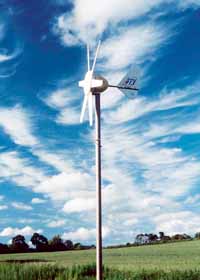Greater assurance for small-scale renewables

The Microgeneration Certification Scheme (MCS) was originally introduced three years ago as a way of improving the public perception of relatively new and unfamiliar technologies.
Many companies now use the MCS logo as a selling point when trying to attract new customers and it is also being used by the government as a “yardstick” for which micro-generation installations should be eligible for financial incentives. Here is an overview of how the scheme works and what protection it affords.
What is the Microgeneration Certification Scheme?
MCS is an industry-funded assurance scheme that aims to ensure the quality of renewable technology installations, companies and products – it is similar to the Gas Safe Register.
It is designed to raise standards, protect consumers and provide information through the certification mark. A steering group sets MCS standards based on international and European standards already in use and in accordance with the internationally-recognised EN45011 standard. It is operated under the authority of the Department of Energy and Climate Change (DECC).
What does it apply to?
MCS applies to renewable electricity generation systems smaller than 50kW and renewable heat systems smaller than 45kWth.
Certification is available for renewable energy products and the installation companies. To get MCS certified, installers and/or their products must be approved by a licensed certification body (eg BSI or Corgi).
What technologies are covered?
Solar domestic hot water, solar photovoltaics, micro-wind, micro-hydro, biomass, heat pumps, micro-combined heat and power, renewable CHP and fuel cells.
Why is it important?
If your electricity generating installation is sub-50kW, you need to use an MCS-certified installer and product to be eligible for the government’s Feed-in Tariff payment. To qualify for FiTs, these products must be installed and commissioned by an MCS installation company at any time from the date they have been listed on the MCS website, up until six months after the date they have been removed from the website.
For small and medium-sized renewable heat generation plants (up to and including 45kWth), both installers and equipment will also need to be certified under the MCS to qualify for the Renewable Heat Incentive. Further details on this are due to be confirmed by DECC this summer, ahead of the scheme’s scheduled launch in July.
How do I find an approved company or product?
You can find an MCS-certified product or installation company to carry out an installation by using the searchable databases on the MCS website. At the time of writing there were over 2,200 accredited products and a similar number of installers on the databases. The product search lets you sort results by product type (eg solar, biomass), by manufacturer or other keyword. In the installer search you can sort by product type, postcode or installer name.
Once you have chosen a company and the installation work is complete, the MCS installer will provide you with an MCS certificate. This certificate will be needed by your FiT licensee (eg the electric company) in order to complete the registration process for FiT payments.
What protection does MCS give?
MCS product accreditation requires products to consistently meet certain performance and safety standards. These standards are set out on the MCS website and cover everything from durability of fixings to compliance with legal requirements.
Installer accreditation ensures that installers offer a set level of technical competence (including health and safety) for staff and contractors, plus consumer protection. As part of this, they must sign up to a code of practice which meets Office of Fair Trading guidelines. It covers areas such as complaints procedures, measures to prevent mis-selling, deposit protection, arbitration and disputes.
Are there other assurance schemes?
Currently MCS is the only such scheme for small-scale renewable energy technologies, although there is another scheme equivalent to MCS for solar thermal products called the CEN Solar Keymark Scheme.
What about systems over 50kW?
There are no assurance schemes similar to MCS for larger systems, but larger-scale renewable energy generators are required to register with Ofgem’s Renewables and CHP Register. This is an electronic, web-based system used to manage the renewables and CHP schemes that Ofgem administers on behalf of the government. Generators who want to participate in any of the renewable schemes (including FiTs) can apply for accreditation.
Where can I find out more?
MCS: Visit www.microgenerationcertification.org or call the MCS helpdesk 0207 0901082, or email mcshelpdesk@gemserv.com
Over 50kW: www.ofgem.gov.uk or call 0207 901 7310
CEN Solar Keymark Scheme: http://www.solarkeymark.org
FiTs/RHI latest: www.decc.gov.uk
